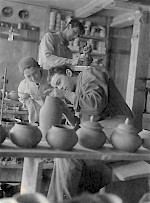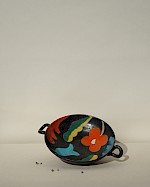Born on August 5, 1903, in the Alpine town of Engelberg, Switzerland, Benno Geiger was immersed in art from an early age. Raised in Paradiso near Lugano, he inherited his creative spirit from his father, Wilhelm Geiger, an ivory carver and sculptor, and his mother, Marie Geiger-Auinger.
From 1920 to 1922, Geiger trained under renowned ceramicist Heinrich Meister in Stettbach (Dübendorf). His vision matured in Vienna at the Kunstgewerbeschule (1925–1927), where he studied under the influential Michael Powolny. In 1928, Geiger became head of modern ceramics at the famed Goldscheider Manufactory in Vienna, a leader in ceramic design. A formative period in Paris followed, before his return to Switzerland in the mid-1930s to direct the ceramic department at the Aedermannsdorf pottery.
In 1941, Geiger became director of the Bern Ceramic School, a position he held until 1969. There, he shaped generations of Swiss ceramicists and helped define the country’s modern ceramic identity. In 1959, he co-founded the Swiss Ceramists’ Association, cementing his influence as both artist and advocate.
Geiger’s work—delicate, modern, and deeply rooted in material—features in major collections such as the Swiss National Museum and the Matzendorf Ceramic Museum. One of his most renowned pieces, a 14-part ceramic Stations of the Cross, graces the Church of St. Francis in Zollikofen, reflecting his ability to merge sacred themes with modernist form.
For Geiger, clay was more than material—it was philosophy. As one contemporary put it: “He can draw and paint, can turn and model, he is a technician and chemist, and last but not least a philosopher, for whom the union of the four elements—earth, water, fire, and air—into a work of art becomes religion.”

